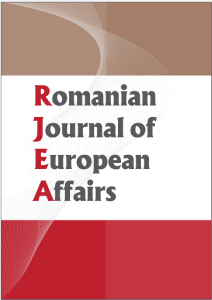The Monetary Union: the Decade ahead. The Case of Non-Member States
Daniel Daianu, Laurian Lungu
Abstract:
What are the prospects for New Member States to join the euro-zone in the not too distant future? They seem to be in a catch-22 situation. Because of the current financial crisis some Maastricht criteria it would be more difficult to fulfil in the short and medium term, which would make it hard for them to join the eurozone. But there is also an argument, which highlights benefits of a faster accession due to dynamic effects for the countries involved and for the eurozone as a whole.
Keywords: enlargement, EU, Europe, eurozone, finance
Le binome euro -dollar sous le signe de l’incertitude
Ana Bal
Abstract:
Will the Dollar remain the dominant international currency (mainly as a reserve currency)? To answer this question, the paper presents in the first part the opinions of the most prominent experts concerning the determinant factors of an international currency status, in the two sphere of utilization: public and private. The most important are: the magnitude of the economies of emission, the externalities of network, the liquidity of their financial market, the confidence in their stability. Then there follows the evaluations concerning the two international currencies, Dollar and Euro, from these perspectives. Finally, the paper evaluates their role as measure of value, instrument of reserve and instrument of payment in the international economic relations. In the second part, the paper evaluates the recent tendencies of the exchange rate Euro/Dollar (2006-2008) from the point of view of fundamentals. After a period of depreciation, from the middle of the year 2008 until now, the dollar marked an unexpected appreciation towards the euro. But, the global financial and economic crisis increases the incertitude concerning the evolution of the exchange rate euro/dollar. Undoubtedly the two currencies will remain the prominent international currencies and the dollar the main reserve currency. Finally the paper presents Mundell’s proposal of stabilization of the binomial euro/dollar.
Keywords: appreciation, depreciation, exchange rate, fundamentals, international currency
To Talk or not to Talk? Reflections on Central Bank Communication in Times of Crises
Anton Comănescu
Abstract:
During the last decade, central bank communication and transparency became undisputable conditions of an effective monetary policy. Central banks around the world seek to consolidate their credibility by communicating effectively their policy goals to the financial markets and the public at large. Nevertheless, transparency has its challenges, particularly in times of financial turmoil when markets can misinterpret central bank messages. The way central banks manage to maintain credibility through effective communication both in normal and exceptional situations remains part of the art of monetary policy. Important challenges are posed to communication, in the context of conflicting pressures towards disclosure versus secrecy. The mantra of transparency still has its ayatollahs but some precepts have to be reconciled with the risks of misguiding the markets. Crowding out of private information, potential fuelling of banking panics and moral hazard are few of the problems that could threaten the performance of a central bank in communicating to its various audience.
Keywords: central bank, communication, financial crisis, transparency
New Developments in the EU Internal Market – Harmonisation vs. Mutual Recognition
Ljubica Dzabirova
Abstract:
This paper studies the recent developments of harmonisation measures in the area of free movement of goods, establishments, services and the recognition of professional qualifications at the European Union (EU) level, regarding the principle of mutual recognition. The new harmonisation measures signify a new practice and a different approach, by presenting mutual recognition in a different way, in the context of harmonisation measures. There is also an interrelation between different EU institutions concerning their action, i.e., an interesting link between the legislative processes on the EU level and the actions of the European Court of Justice (ECJ). This situation can be illustrated by the Commission seizing upon mutual recognition as a strategy for market integration in the wake of the Cassis de Dijon judgment. An open market may impact the weaker economies that could suffer in the increased competitiveness of more open markets. As Dehousse argues, “market integration has to be accompanied by improvements in social and economic cohesion, if it was to be politically acceptable.” Similarly, Armstrong notes that the removal of barriers to trade through mutual recognition can create positive trade possibilities for states with efficient production, while less efficiently producing states face the prospect of domestic production being displaced by competition, which may need to be cushioned through negotiations of Structural Funds.
Keywords: ECJ, harmonisation measures, internal market, legislative process, mutual recognition, services, Structural Funds
Migration Effects of Romania’s Accession to the EU: the Case of Moldova
Adrian Pop
Abstract:
The paper aims to assess the main migration effects upon Romania following its accession to the EU, with a special focus on Moldova as Romania’s immediate neighbour and ENP partner state at the EU Eastern border. It relies on key findings drawn from current literature in the field, statistics provided by the Ministry of Interior and Administrative Reform of Romania, and personal interviews of the author with relevant authorities and experts both in Romania and Moldova. The paper surveys the major source areas and countries for irregular migration affecting Romania, the methods and routes used in irregular migration, various aspects of Romania’s visa policy towards Moldova, the main features of the process of regaining Romanian citizenship by Moldovan nationals and the most important characteristics of migration from Moldova to Romania. The paper also introduces a number of recommendations on regulating labour migration, combating irregular migration and organized crime, control procedures at border checkpoints, visa policy, and dissemination of information, whose aim is to help improve the migration policies of Romania, Moldova, and Ukraine as well as their cooperation from a cross-border perspective.
Keywords: circular migration, irregular migration, labour migration, visa policy
La differenciation – « solution miracle » pour l’avenir de l’Union Europeenne?
Bogdana Petrica
Abstract:
The differentiation has always accompanied the process of integration and it became more evident with the succession of enlargements. This concept originated in the practice of a tighter co-operation between some Member States in certain areas, or in the exceptional derogations given to other Member States which refused participation. Not only these exceptions may become the rule in an enlarged Union, but they appear as being the only solution, sometimes sensitive, and thus spring the need to be well organized. Beginning with the Treaties of Amsterdam and Nice the differentiation is legally enshrined, but it is the works of the Convention for the Drafting of the Constitutional Treaty that advanced the debate on this subject. Finally, the Lisbon Treaty kept most of the provisions of the Constitutional Treaty regarding this subject and for its ratification; it is precisely the concept of differentiation that we shall employ. The Irish “No” demonstrated once more the inevitable obstructions of the unanimity rule, and differentiation might be a solution, while still respecting the diversity of Member States.
Keywords: CFSP, differentiation, enhanced cooperation, ESDP, structured cooperation, Treaty of Lisbon






